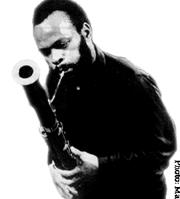








JACOB H. CARRUTHERS FOR INNER CITY STUDIES
Ewart Douglas
Perhaps best known as a composer, improviser, sculptor and maker of masks and instruments, Douglas R. Ewart is also an educator, lecturer, arts organization consultant and all around visionary. In projects done in diverse media throughout an award-winning and widely-acclaimed 30-year career, Mr. Ewart has woven his remarkably broad gifts into a single sensibility that encourages and celebrates--as an antidote to the divisions and compartmentalization's afflicting modern lifethe wholeness of individuals in culturally active communities.
Born in Kingston, Jamaica in 1946, Douglas R. Ewart emigrated to Chicago, Illinois in the United States in 1963. His travels throughout the world and interactions with diverse people since then has again and again confirmed his view that the world is an interdependent entity. An example of his efforts both to study and to contribute to this interdependence is his use of his prestigious 1987 U.S.-Japan Creative Arts Fellowship to study both modern Japanese culture and the traditional Buddhist shakuhachi flute, and also to give public performances while in Japan. In America, his determination to spread his perspective is part of the inspiration behind his often multi-disciplinary works and their encouragement of artist-audience interactions. It is also the basis of the teaching philosophy with which he guides his classes at the School of the Art Institute of Chicago, where he has taught since 1990, and the basis of the perspective he has brought to his service on advisory boards for institutions such as The National Endowment for the Arts, Meet the Composer (New York City) and Arts Midwest. His use of his current chairmanship of the internationally renowned Association for the Advancement of Creative Musicians (AACM) to celebrate and build upon the history and achievements of the organization is from this perspective a natural extension of the activities he has been engaged in for the past four decades.
His administrative, teaching and other duties have not prevented Ewart from maintaining two musical ensembles, the Nyabingi Drum Choir and the Clarinet Choir. Nor has it prevented him from releasing some of the resulting his music on his own record label, Aarawak Records (founded in 1983), which has released his Red Hills and Bamboo Forest.
Always seeking new ways to be an agent of transformation, and convinced that compositions should change, just as their performers do, Ewart has created new or revised musical forms, such has his suite Music from the Bamboo Forest, which is in a state of constant evolution (its score currently comprises six movements employing a cornucopia of flutes, reeds, percussion instruments--many of them handmade -- and significant audience participation). Each performance or production by Ewart reflects time-tested structures, but each also incorporates his most immediate experiences of America and the world, and taps his many creative engagements with collaborators such the master musicians as Muhal Richard Abrams, the Art Ensemble of Chicago, Anthony Braxton, Alvin Curran, Anthony Davis, Robert Dick, George E. Lewis, James Newton, Cecil Taylor, Von Freeman, Rita Warford, Dee Alexander, Amina Claudine Myers, Richard Teitelbaum and Henry Threadgill. Beyond sound itself, Ewarts music finds natural extensions (in every sense of the word) in the instruments he makes, which run the gamut from unique wind instruments to percussion instruments. Beyond these are sculptures, sound sculptures, and individually handcrafted masks that have been exhibite at Museum of Contemporary Art and the Art Institute of Chicago, among others.
All these elements of his art are on display every year in Chicago and in other cities in stagings of "Crepuscule," which in Ewarts own opinion best represents his celebratory spontaneity and commitment to organic inclusivity. A massive collective composition, "Crepuscule" is a celebration of sunset that brings together diverse musical groups, dancers, artists and activist for a musical and visual event that has become one of the signature programs of the Jazz Institute of Chicago, being held annually at the city's Washington Park.
Tags: Free Jazz
Visit our Facebook page and follow us on Twitter!
Check our EVENTS page for upcoming shows!
©2014 The Great Black Music Project. All rights reserved.